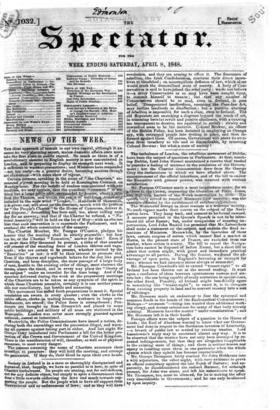The turbulence of London, the rebellious movement of Dublin; have
been the subject of questions in Parliament. At first, touch- ing.Dublin, Lord John Russell maintained a reserve that tended to provoke a feeling of mistrust in the resolution of the Govern- ment; but the Chartist demonstration drew from Sir George Grey the declarations to which we have alluded above. The announcement of the official intentions, and of the bill to endow the Executive with greater powers, was received with evident satistUction.
- • Mr. Feaegus O'Connor made a most inopportune move, for an Meese to the Crown, requesting the liberation of Frost, Jones,
leaders of the Welsh insurravtiens in 1839. His speeat --cil4served to remind' Ministers ;hew 'necatiivirv was the example ^ ed by the puniehusent of receless tlArista'aers. The Ministerial energy in these matters is a welcome novelty. No such vigour marks their course on the subject of the Navi- gation-laws. They hang back, and consent to be forced onward. A measure promised in the Queen's Speech is not to be intro- duced till tiller Easter ; but, under compulsion of sneering im- portunities, Lord John Russell has promised that Mr. Labouehere shall make a statement on the subject, and explain the final in- tentions of Ministers. Meanwhile, by the operation of those laws, certain cargoes of cotton which cannot' find a market at Havre, in the present state of France, are excluded from our market, where cotton -is scanty._ The bill to repeal the Naviga- tion-laws cannot be disposed of before Easter, but a short bill to admit that cotton might, with great and immediate practical advantage to all parties. During the famine, we thund the ad- vantage of open .ports, in Eqgland's becoming an entreptit for corn ; whence we had immense stores always at command'.
Mr. Sharman Crawford's bill to extend " tenant-right " to all
Ireland has been thrown out at the second reading. It went upon a confusion of ideas between spontaneous custoin apd.ate- tute law; the one being capable of ready correction in special cases, the other fixed. Possibly, all Ireland might beneficially agree to something like "tenant-right"; to enact it, is to derugate from existing property in land and to-convert tenancy into a sort of villeinage.
Mr. Horsman made an endeavour to fuse the episcopal and common funds in the hands of the Ecclesiastical-Commissioners ; Bishops—" overseers "—being. less, wanted than additional work- ing clergy, and decent subsistence for many of that body already existing. Ministers have the matter" tinder consideration"; and Mr. Horsman left it in their hand& Foreign affairs were the subject of a question in the House of
Lords ; the Earl of Aberdeen -wanted to -know what our Govern- ment had done in respect to the Sardinian invasion Of Lombardy, —a breach of public law as settled by existing treaties. Lord Lanadowne's reply may be construed almost any way. It is to be observed that the weaties have not onlybeen destroyed' by tee pasted infringements, but, that they are altogether inapplitiable to the existing state of things ; and there is neither reason not equity in insisting upon them . in one particular when the whole
system which they upheld hoe Ifecoineamprecticabte..: .
Mr. George Thompson fairly startled Sir Johq flobhouse into a wild adjuration the other-night, Witham/re evidence to prove an official conspiracy against the late Rajah of Sattarai arid ap- parently, be dumbioundered the radiant Baronet, for aishoagh present, Sir John was *lent, and left his subordinate to spoak. Mr. Tnompson,-too,nust be silenced, for he is making the affair very discreditable to Government ; and he can only be silenced by open inquiry.


























